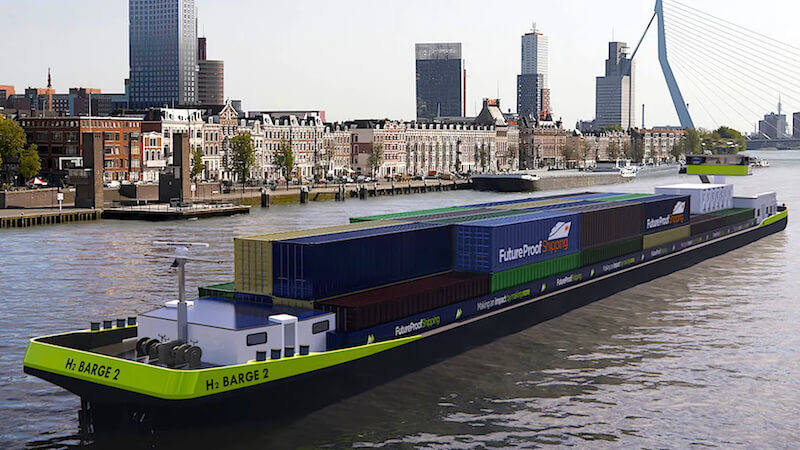With the H2 Barge 2, the Dutch shipping company Future Proof Shipping (FPS) has developed a hydrogen ship to transport containers on the Rhine. The aim is to save thousands of tons of CO2 emissions.
When it comes to decarbonization in the logistics industry, batteries are not always a solution. This is because lithium-ion batteries tend to cause problems in aircraft and ships and are not yet a real alternative to kerosene and oil. However, a change can be seen on the water in particular. Hydrogen in particular is often seen as the fuel of the future.
The H2 Barge 2, a newly developed hydrogen fuel cell ship, is designed to transport containers on the Rhine between Rotterdam (Netherlands) and Duisburg (Germany) and reduce CO2 emissions by 3,000 tons per year. The Dutch shipping company Future Proof Shipping (FPS) developed the sustainable vessel with funding from the European Union, among others.
H2 Barge 2: Hydrogen ship to reduce emissions
The boat was originally built as a conventionally powered container ship. However, the shipping company then converted the H2 Barge 2 (formerly Fenny 1 and FPS Waal) to an electric drive. It consists of six fuel cells, a hydrogen storage unit and several battery packs below deck. These achieve a total output of around 1.2 megawatts.
Compared to its previous operating modes, the H2 Barge 2 is expected to be able to transport the same number of containers. However, this is expected to save 3,000 tons of CO2 annually. The development also shows that it is already possible and feasible to convert conventional container ships. After all, inland shipping continues to play an important role in the transportation of goods in Europe.
Hydrogen still the best alternative to fossil fuels
In everyday operation, the H2 Barge 2 should provide valuable insights into how practicable it is to convert ships in the long term by using batteries in combination with green hydrogen in a fuel cell. Another vessel in the EU Flagships project, the Zulu 06, is expected to be deployed in Paris later this year.
While hydrogen is still considered to have little future potential for vehicles, a different picture is emerging in areas such as container transportation, port facilities, quarries and on the water. This is because the high energy density of the fuel makes it a viable option for heavy-duty applications where batteries are currently still reaching their limits.










